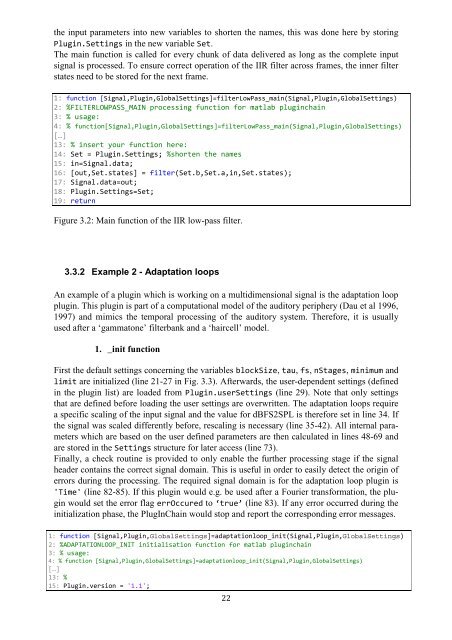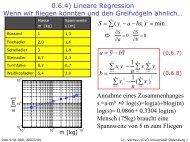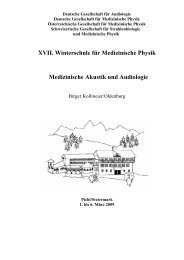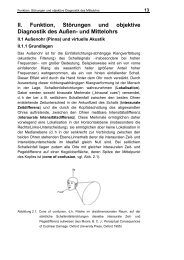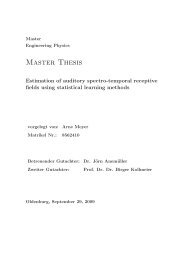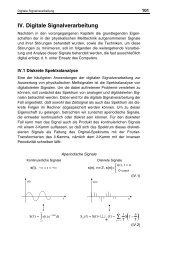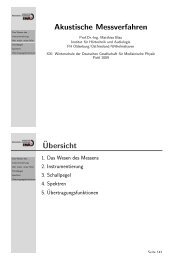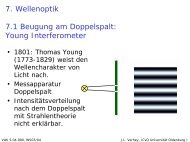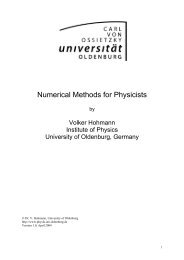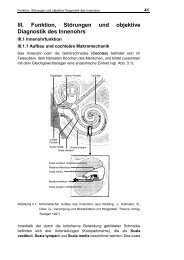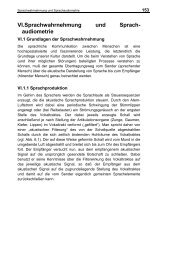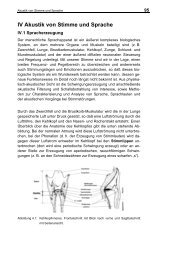PlugInChain documentation - Universität Oldenburg
PlugInChain documentation - Universität Oldenburg
PlugInChain documentation - Universität Oldenburg
You also want an ePaper? Increase the reach of your titles
YUMPU automatically turns print PDFs into web optimized ePapers that Google loves.
the input parameters into new variables to shorten the names, this was done here by storing<br />
Plugin.Settings in the new variable Set.<br />
The main function is called for every chunk of data delivered as long as the complete input<br />
signal is processed. To ensure correct operation of the IIR filter across frames, the inner filter<br />
states need to be stored for the next frame.<br />
1: function [Signal,Plugin,GlobalSettings]=filterLowPass_main(Signal,Plugin,GlobalSettings)<br />
2: %FILTERLOWPASS_MAIN processing function for matlab pluginchain<br />
3: % usage:<br />
4: % function[Signal,Plugin,GlobalSettings]=filterLowPass_main(Signal,Plugin,GlobalSettings)<br />
[…]<br />
13: % insert your function here:<br />
14: Set = Plugin.Settings; %shorten the names<br />
15: in=Signal.data;<br />
16: [out,Set.states] = filter(Set.b,Set.a,in,Set.states);<br />
17: Signal.data=out;<br />
18: Plugin.Settings=Set;<br />
19: return<br />
Figure 3.2: Main function of the IIR low-pass filter.<br />
3.3.2 Example 2 - Adaptation loops<br />
An example of a plugin which is working on a multidimensional signal is the adaptation loop<br />
plugin. This plugin is part of a computational model of the auditory periphery (Dau et al 1996,<br />
1997) and mimics the temporal processing of the auditory system. Therefore, it is usually<br />
used after a ‘gammatone’ filterbank and a ‘haircell’ model.<br />
1. _init function<br />
First the default settings concerning the variables blockSize, tau, fs, nStages, minimum and<br />
limit are initialized (line 21-27 in Fig. 3.3). Afterwards, the user-dependent settings (defined<br />
in the plugin list) are loaded from Plugin.userSettings (line 29). Note that only settings<br />
that are defined before loading the user settings are overwritten. The adaptation loops require<br />
a specific scaling of the input signal and the value for dBFS2SPL is therefore set in line 34. If<br />
the signal was scaled differently before, rescaling is necessary (line 35-42). All internal parameters<br />
which are based on the user defined parameters are then calculated in lines 48-69 and<br />
are stored in the Settings structure for later access (line 73).<br />
Finally, a check routine is provided to only enable the further processing stage if the signal<br />
header contains the correct signal domain. This is useful in order to easily detect the origin of<br />
errors during the processing. The required signal domain is for the adaptation loop plugin is<br />
'Time' (line 82-85). If this plugin would e.g. be used after a Fourier transformation, the plugin<br />
would set the error flag errOccured to ‘true’ (line 83). If any error occurred during the<br />
initialization phase, the <strong>PlugInChain</strong> would stop and report the corresponding error messages.<br />
1: function [Signal,Plugin,GlobalSettings]=adaptationloop_init(Signal,Plugin,GlobalSettings)<br />
2: %ADAPTATIONLOOP_INIT initialisation function for matlab pluginchain<br />
3: % usage:<br />
4: % function [Signal,Plugin,GlobalSettings]=adaptationloop_init(Signal,Plugin,GlobalSettings)<br />
[…]<br />
13: %<br />
15: Plugin.version = '1.1';<br />
22


